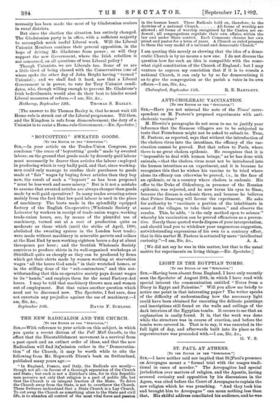ANTI-CHOLERAIC VACCINATION.
[To THE EDITOR Or THE " SPECTATOR...1 SIR,—Have you not misread the note of the Times' corre- spondent on M. Pasteur's proposed experiments with anti- choleraic vaccine ?
M. Blowitz's paragraphs do not seem to me to justify your inference that the Siamese villagers are to be subjected to tests that Frenchmen might not be asked to submit to. True,. M. Pasteur, as reported, says that without the introduction of the cholera virus into the intestines, the efficacy of the vac- cination cannot be proved. But that refers to Paris, where there is no great cholera epidemic. He recognises that it is. "impossible to deal with human beings," as he has done with animals, —that the cholera virus must not be introduced into the human intestines as an experiment, and it is because he recognises this that he wishes his vaccine to be tried where alone its efficacy can otherwise be proved, i.e., in the face of an epidemic, or in a country where cholera is endemic. His. offer to the Duke of Oldenburg, in presence of the Russian epidemic, was rejected, and he now turns his eyes to Siam,. because the disease is endemic there, and because he believes that Prince Damrong will favour the experiment. He asks for authority to "vaccinate a portion of the inhabitants in some of the villages, to take their names," and observe the results. This, he adds, 'is the only method open to science whereby his vaccination can be proved efficacious as a preven- tive. Surely these quoted words dispose of your interpretation, and should lead you to withdraw your ungenerous suggestion, notwithstanding expressions of his own to a contrary effect,. that in this matter M. Pasteur is actuated by mere "intellectual [We did not say he was in this matter, but that is the usual motive for experiments on living things.—En. Spectator.]


































 Previous page
Previous page